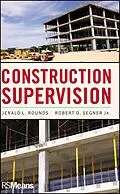This book covers all supervisory situations one is likely to encounter on a commercial, industrial, or institutional construction project. The book is based upon a very successful Electrical Project Supervision (EPS) training program developed by Rounds and Segner for the National Electrical Contractor?s Association and licensed to several organizations representing other construction sectors. This program has been delivered for over a decade and continues to be delivered to thousands of construction supervisors each year. The program content has consistently received outstanding reviews and evaluations in numerous different venues.
Autorentext
Jerald L. Rounds, PhD, PE, is Associated General Contractors Endowed Chair in Construction Management and Construction Engineering at the University of New Mexico. As a certified Class "A" construction superintendent in Denver, he served as project manager on a number of commercial building projects prior to more than thirty years as a construction educator. Concurrently, he has developed numerous training programs in project management and supervision for the construction industry. Most recently, he codeveloped the NECA Electrical Project Supervision training program with Robert Segner, with whom he has conducted "train the trainer" sessions for the past decade.
Robert O. Segner Jr. is a professor of construction science in the College of Architecture at Texas A&M University. He followed years of construction practice with four decades in construction higher education. He has served as president of the American Council for Construction Education. Segner codeveloped the NECA Electrical Project Supervision training program with Jerald Rounds and has conducted "train the trainer" sessions for the past decade. He has developed and taught numerous other continuing education programs.
Klappentext
Construction/Construction Management
Must-have management strategies for construction supervisors working in the field
Construction Supervision inspires supervisory excellence with proven tactics and techniques applied by thousands of construction supervisors over the past decade. Recognizing the unique and critical role the supervisor plays in project success, the book's leadership guidelines carve out a practical blueprint for motivating work performance and increasing productivity through effective communication. Key lessons emphasize adaptable strategies for managing risk and unexpected workflow challenges. Beginning with the definition and importance of supervision and ending with the increasingly important role construction supervisors will hold in the future, this book covers a wide range of topics, such as best practices for accomplishing project objectives, managing physical resources, schedules and costs, team building, and much more.
Construction Supervision features:
-
A unique focus on field supervision and crew management
-
Coverage of supervision from the foreman to the superintendent level
-
An overview of technical skills whose mastery will build confidence and success for the supervisor
-
A detailed view of "soft" management and communication skills
From planning and executing in the field to juggling responsibilities on the fly, Construction Supervision fosters preparedness with a broad range of supervisory situations one is likely to encounter on a commercial, residential, industrial, or institutional construction project, and offers sound advice for solving the most complex management issues.
Inhalt
Preface xix
The Role of the Supervisor xix
Intended Audience xx
The Book's Structure and Organization xxi
Making the Most of the Book xxii
Acknowledgements xxiii
Section I: Setting the Stage 1
Chapter 1: Overview of the Construction Industry 3
Introduction 3
Construction Volume and Impact on Society 4
Profit, Profitability, and the Supervisor's Impact 5
Competition, Risk, and Construction Company Failure 6
Definitions and Roles of Construction Team Members 8
Becoming an Effective Supervisor 12
Summary 12
Chapter 2: Supervision and the Supervisor 15
Introduction 15
Definition of Supervisor 15
The Supervisor's Functional Role in a Construction Company 16
The Supervisor as Manager 17
Transition to Management 18
Attributes of Successful Supervisors 21
Levels of SupervisionCareer Paths 23
Summary 24
Section II: Soft Skills 27
Chapter 3: Oral Communication 29
Introduction 29
Defining Communication 29
Characteristics of Communication in Construction 30
Improving One-on-One Oral Communication Skills 31
Techniques for Improving the Effectiveness of Oral Communication 35
Active Listening 37
Customer Relations 40
Who Is the Customer? 40
Respecting the Customer 41
The Art of Negotiation 41
Summary 44
Chapter 4: Written Communication and Documentation 47
Introduction 47
Why Write the Message? 48
The Functions of Job Site Documentation 48
Improving Written Communication and Documentation 49
Job Site Communication and Documentation 50
Company Office Communication and Documentation 58
Communications and Documentation Developed Outside the Company 70
Organizing Construction Documents 71
Obtaining Information and Documentation 71
Summary 73
Chapter 5: Team Building and Maintenance 75
Introduction 75
The Critical Need for Effective Construction Teams 76
The Construction Team 78
Team Characteristics 79
Team Formation 82
Maintaining Team Effectiveness 83
Practical Team Building 85
Summary 87
Chapter 6: Maintaining the Relationship Between The Employee and the Employer 89
Introduction 89
Evaluating Performance 90
Diversity and Discrimination 101
Harassment 105
Summary 108
Chapter 7: Managing the Human Resource 111
Introduction 111
The Supervisor as a Leader 112
Styles of Leadership 114
Elements of Motivation 120
Manager, Learn to Better Understand Yourself as Well as Those around You 132
Summary 135
Chapter 8: Risk Management and Problem Solving 137
Introduction 137
Identifying and Dealing with Risk 137
Managing Risk 141
Problem Solving 142
Summary 151
Section III: Technical Skills 153
Chapter 9: Safety 155
Introduction 155
Accidents, Incidents, and Safety Risk 156
The Importance of a Construction Safety Program 156
The Supervisor's Safety Responsibilities and Activities 158
Creating a Safe Work Environment by Removing Job Hazards 159
Developing a Mentality of Safety 163
Effectively Dealing with Safety Events 166
Summary 167
Chapter 10: The Contract as a Management Tool 169
Introduction 169
A Practical Understanding of the Contract 170
Required Elements for an Enforceable Contract 172
Components o...
